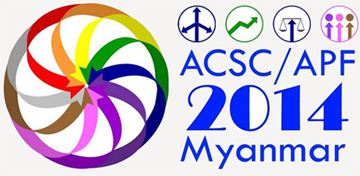Government Leaders Not Ready for Genuine People-centered ASEAN
By Burma Partnership • May 13, 2014 As the leaders of the governments of the Association of Southeast Asian Nations (ASEAN) gathered in Burma for the 2014 summit over the weekend, Cambodian, Malaysian and Singaporean leaders refused to meet with genuine civil society representatives. These three ASEAN member states were poised to substitute the Interface Delegates chosen by civil society groups with their own nominees, which lead the meeting between the ASEAN leaders and civil society representatives to be canceled at the last minute. The ten Interface Delegates were chosen by civil society groups to represent the voices of the 3,000 people who attended the historic ASEAN Civil Society Conference / ASEAN Peoples’ Forum 2014 (ACSC/APF 2014) held in Rangoon, Burma in March.
As the leaders of the governments of the Association of Southeast Asian Nations (ASEAN) gathered in Burma for the 2014 summit over the weekend, Cambodian, Malaysian and Singaporean leaders refused to meet with genuine civil society representatives. These three ASEAN member states were poised to substitute the Interface Delegates chosen by civil society groups with their own nominees, which lead the meeting between the ASEAN leaders and civil society representatives to be canceled at the last minute. The ten Interface Delegates were chosen by civil society groups to represent the voices of the 3,000 people who attended the historic ASEAN Civil Society Conference / ASEAN Peoples’ Forum 2014 (ACSC/APF 2014) held in Rangoon, Burma in March.
In addition, this was the first time that the ASEAN summit provided a space for the ASEAN Youth Forum (AYF) to share the voices of the ASEAN youth. However, mirroring the impertinent substitution of the ACSC/APF 2014 Interface Delegates, only six out of 20 delegates from the AYF were accepted to attend the meeting with the heads of government, while the government selected the other 14 youths.
According to the press release by the ACSC/APF 2014 Regional Steering Committee, the ACSC/APF 2014 stayed flexible with their governments, even going so far as to accept that some delegates chosen by civil society could be rejected by governments, as long as the seats of those rejected will remain vacant. Despite letters and multiple communications with the governments expressing their grave concern over the non-approval and substitution of the 3 civil society Interface Delegates – a clear breach of ACSC/APF’s principles of self-selection and mutual respect – and reiterating the four principles of the ACSC/APF 2014, the government leaders insisted on the substitution. In addition, the ACSC/APF 2014 Regional Steering Committee was informed that only the Myanmar delegate will be allowed to speak for 10 minutes out of 30 minutes total allocated for the Interface, undermining the principle of meaningful dialogue.
This pervasive attempt to replace civil society Interface Delegates has taken place almost every year since the inception of ACSC/APF in 2005. In 2009 in Thailand, the governments rejected the Interface Delegates from Burma, Cambodia and Singapore, prompting a solidary walkout by civil society groups. In Indonesia in 2011, though some governments rejected the civil society delegates and substituted them with their own selection, the Interface was carried out, and worse, the civil society’s statement was changed at last minute by a unilateral decision of the ACSC/APF 2011 host, while the topic was limited by the governments to a single issue, health.
This Interface in Indonesia was the last Interface held between ASEAN governments and independent civil society groups, in combination with government selected delegates. While the governments showed the same patterns of imposing their own nominees this year, the fact that such substitution has to occur almost every year also validates the strong existence of independent CSO and peoples’ movements in ASEAN.
Cambodian civil society has been outraged by the substitution and has called on the government to explain the reasons behind the rejection of Ms. Thida Khus, Executive Director of SILAKA, as their Interface Delegate. Malaysian CSOs have also called for an explanation, appalled at the rejection and substitution of their Interface Delegate.
It was during the 2005 ASEAN leaders’ summit in Malaysia that ASEAN recognized the first ASEAN civil society conference, which highlighted the crucial role that civil society plays in developing a people-centered ASEAN. Nine years later, the Malaysian government has taken a step back in actualizing this vision by rejecting their delegate. In addition, the substitution of Ms. Maria Chin Abdullah, Executive Director of Malaysia’s civil society organization, Persatuan Kesedaran Komuniti Selangor (EMPOWER), clearly shows the Malaysian government’s stance on the upcoming ACSC/APF, as she will chair the civil society conference in 2015 to be held in Malaysia. If ASEAN is serious about creating a people-oriented ASEAN as stated in the ASEAN Charter Article 1.13, the governments of Cambodia, Malaysia and Singapore should be able to provide an immediate explanation as to their decision to substitute the chosen civil society delegates.
Interface Meetings have provided an opportunity and space for civil society groups to engage with ASEAN leaders. Rejecting the interface delegates entails that respective governments do not recognize the national democratic procedure within CSOs, meant to ensure meaningful dialogue with mutual respect and the rights of CSO’s to represent the peoples’ voice. Moreover, it shows disregard for the voices of the 3,000 civil society members who attended the ACSC/APF 2014. The governments of ASEAN must be transparent, and demonstrate commitment to their acclaimed people-centered ASEAN by allowing genuine civil society to partake in future Interface Meetings. Otherwise, the Interface will be a mere publicity stunt for ASEAN and a smokescreen for issues that needs to be urgent addressed for the people in this region.
Tags: 24th ASEAN Submmit, ACSC/APF 2014, ASEAN, ASEAN Youth Forum 2014, Burma Partnership, Civil Society OrganizationsThis post is in: Blog
Related PostsIndonesian Interface Delegates for 24th ASEAN SUMMIT Regret the Cancellation of CSO Interface Meeting
Chairman’s Statement of the 24th ASEAN Summit: “Moving forward in Unity to a Peaceful and Prosperous Community”









 All posts
All posts